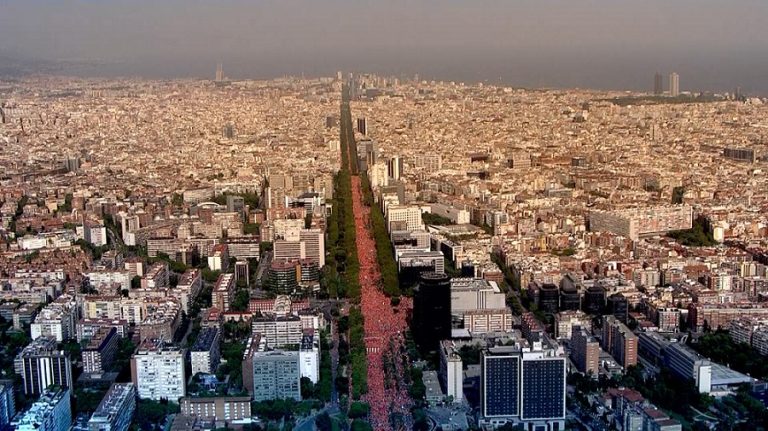
Over a million of people have filled Barcelona today to demand independence for Catalonia. The slogan of the demonstration was ‘Let’s build the Catalan republic’ and illustrates the demand for the application of the democratic mandate arising from the Oct 1 referendum on self-determination, when 90% of voters (43% of the Catalan electorate) voted in favour of Catalan independence.
At 17.14h precisely, the demonstrators at one end started a wave of sound, holding up banners. Meter by meter, just like in a domino effect, the wave of sound moved on to the other end of the demonstration, where it symbolically felled a wall. The wall symbolises the adversities, obstacles and repression, now and in the future, that prevent the application of that democratic mandate for self-determination, a right all people are entitled to, as recognised by the Charter of the United Nations and the International Covenant on Civil and Political Rights, both ratified by Spain.
Human rights lawyers Ben Emmerson and Aamer Anwar and Prof Schulze MD at the Diada
Among the speakers this year were three prestigious European personalities: Aamer Anwar, the acknowledged Scottish human rights lawyer, in charge of the legal defence of Catalan ex-minister Clara Ponsatí; Thomas Schulze, the German university professor recognized for his staunch defence of the Catalan cause in Europe; and lastly Ben Emmerson, the English international and human rights lawyer in charge of the defence before the United Nations of President Carles Puigdemont and other Catalan politicians.
Aamer Anwar recalled the right to self-determination as a “fundamental” right and praised the Catalan people for having built a movement that has constantly followed the principles of “internationalism, justice, equality and liberty.” He likewise sent out a clear message: “Silence cannot be an option for those on the side of justice.”
Anwar was extremely critical of the role of the Spanish State and exclaimed that General Franco would be really proud of this Spain, acting like a fascist dictatorship, sending a clear message to Prime Minister Pedro Sanchez: If he is really interested in finding a political solution to the Catalan conflict, he must free all the political prisoners unconditionally, and allow Clara Ponsatí and the other exiles to return.
Emmerson forecast in turn that within a year, Catalonia would be an independent republic, and referred to the resolution to be made by the United Nations shortly, which he expects will consider Spain has violated the civil rights not only of the political prisoners, but also of those who voted for them.
For Emmerson, in democracy debate on political change “is not a crime” and there must be the right to hold and vote in a binding referendum free of violence and intimidation by a paramilitary police force at the service of the special interests of Franco’s heirs who are trying to force the Catalan people into submission.
Both Emerson and Anwar have sent a message to Pedro Sanchez: the only hope for a negotiated agreement is to take measures now, before the trial begins, and this means releasing the political prisoners.
Finally, Professor Schulze reminded the world that the Catalans have won their right to be free. He recalled the words of American president Kennedy during his visit to Berlin: “Today, in the world of freedom, the proudest boast is ‘Ich bin ein Berliner’.” Schulze adapted it to the present and said that he and many foreign friends of Catalonia are proud to affirm ‘I am a Catalan!’
ANC president Elisenda Paluzie demanded the establishment of the Catalan republic
Elisenda Paluzie, Chair of Catalan National Assembly, denounced the Spanish repression during the Oct 1 referendum and that this goes on in the present. Nonetheless, she sees that the Catalans are hopeful and determined to continue, even if they have a Spanish State before them ready to violate basic rights such as the freedom of expression, information, assembly, press and the right to vote. Even if there are also political prisoners and exiles, whose ‘shameful trials’ are expected in the autumn.
She also stressed that the universal right to self-determination had been violated and beaten down with police violence. But the Catalans went out and voted in massive numbers. According to Paluzie, the Catalans showed the world their determination to become an independent nation and that the future is in the hands of the people.
She denounced that the republic hadn’t been defended in October after the pro-independence supporters and parties had won two elections and the referendum. Civil society now demands the establishment of the republic and that the Catalan government respect and make effective the Oct 1 mandate and that of the elections.
She concluded that the republic will be inclusive, there for the majority that wants it, but also for the minority that doesn’t hope for an independent Catalonia.
The Diada – the Catalan National Day, celebrated worldwide
This year’s Diada has had a markedly international nature. It has not only been held in Barcelona, the Catalan National Assembly has also organised demonstrations in other 40 other cities worldwide, a patent success, as there have never before been that many locations celebrating the Diada. During the weekend, major cites in Europe and worldwide have brought together Catalans residing there with locals who sympathise and who are interested in our cause.
This Diada for the Catalan Republic is the seventh consecutive Diada where the independence movement has massively filled the streets in a civic and peaceful demonstration, unique in Europe.